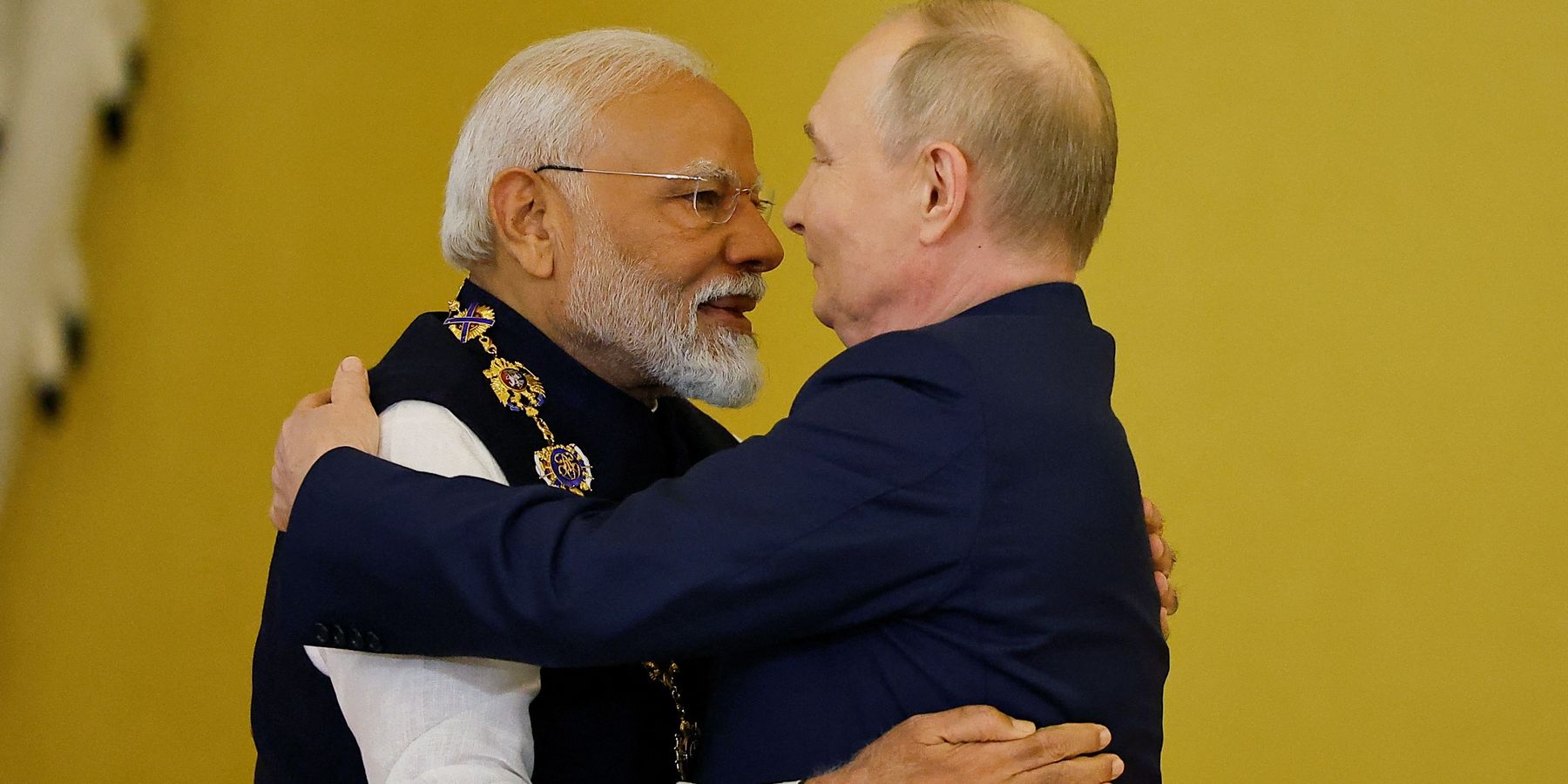Indian Prime Minister Narendra Modi literally embraced Russian President Vladimir Putin in Moscow this week. Not just once, but a number of times, and in front of cameras.
It provided for a lot of colorful optics and press speculation, suggesting that the two were trying to send a message about their bilateral relations to the rest of the world. But what were they trying to say? Let’s examine.
At first, Russia seemed an unlikely destination for Modi’s first foreign visit since India’s national elections granted him a third term and continued success for his Bharatiya Janata party. But the Russian daily newspaper Kommersant soon promoted Modi’s visit as not only a boon to both countries, but as an important diplomatic victory for Moscow:
"While the U.S. and its allies discuss military issues countering Moscow’s [interest]," the paper declared, "one of the informal leaders of the Global South will be reaching agreement with the Russian president on general steps for bilateral cooperation and how to strengthen international security.”
According to reports, the two sides discussed strengthening and deepening military ties between the two countries and partnership in the atomic energy sector, among other issues. Modi also raised the necessity to end the fighting in Ukraine. “Bombs and rockets do not secure peace,” Modi said according to Kommersant, adding, “therefore we need to give accent to dialogue, and dialogue is necessary” — comments indicating that Modi may be trying to personally get involved in peace negotiations.
Russian and Indian geopolitical ties consist of several components, first of which is their respective Global South roles. India, like many members of this club, has maintained an unaligned position on Russia’s invasion of Ukraine but reportedly believes a resolution to the “conflict cannot be achieved through military means alone.”
Such “neutrality” has helped Russia attain positive soft power and reputational benefits that aid Russia’s expansion of trade and favorable political arrangements with many countries in the Global South as the war in Ukraine continues.
Bilaterally, this position has allowed Russia and India to continue expanding their energy trade and India to benefit from lower prices from Russian fuel. For example, pre-Ukraine war India imported almost no Russian oil. But since Western countries imposed oil sanctions on Russia at the end of 2022, India has become the second biggest importer of Russian oil, after China.
Currently, trade is almost all one-way as India produces little that Russia wants, and the rupee is not a convertible currency. According to the Indian foreign secretary, trade between India and Russia reached a record $65.7 billion in the 2023-2024 financial year, but Indian exports to Russia (pharmaceuticals, chemicals, electrical and mechanical equipment, iron and steel) totaled a mere $4.26 billion, versus imports from Russia which were $61.44 billion. During the meeting this week both sides agreed that their goal is to increase total trade to over $100 billion by 2030. However, the existing trade deficit continues to make India a bit uneasy, and it is expected Modi will try to get Russia to increase future imports.
A second component of the Russia-India relationship is China. Given its strong distrust of Beijing over ongoing border tensions, India was clearly unnerved by the deep support exhibited by Xi and Putin for one another during Putin’s visit to China in May. Moscow’s increased reliance on China militarily and politically is a concern to India, too, given the fact that India remains heavily reliant on Russian produced arms and hardware for its own defense.
Moreover, India does not share the exuberance Moscow does for BRICS expansion or for the Shanghai Cooperation Organization (SCO). Such moves pose a risk to India’s continued outreach to the West via participation in the G20. In fact, Modi did not attend last week’s SCO meetings in Astana, Kazakhstan.
Delhi does not support China’s Belt-Road Initiative, either, preferring the North-South Corridor which leaves out China. At the G20 summit, India also announced the new India-Middle East-Europe Economic Corridor (IMEC) corridor project together with Saudi Arabia that would link India’s markets, via the Middle East and Israel, to Europe — excluding both China and Russia.
From a geopolitical perspective, Modi likely recognizes the opportunities for India to build on the progress that Putin’s visits to North Korea and Vietnam have created between China and Russia. India would prefer these two countries under Russia’s influence than China.
A third component of Russian and Indian ties is the United States. Until recently, U.S.-India bilateral relations had been improving. However, the State Department recently included India on its list, along with Russia, as a “Country of Particular Concern” regarding religious freedom. India responded critically, calling it “propaganda against India.”
Meanwhile, U.S. Deputy Secretary of State Kurt Campbell said that India’s relations with Russia impede Indo-American technology cooperation, a statement that India could easily view as meddling in its sovereign affairs. Therefore, the timing of Modi’s visit could be a signal to Washington that India has global options outside of the American-led orbit. Putin would clearly not object to this message.
It will be interesting to see what deliverables emerge from the visit. The Russo-Indian relationship is clearly an incredibly important one for both countries in the present and the long-term future.
However, it is also a relationship that must balance sovereign interests with varying partners and enemies. Although it has been revealed that the two sides discussed their thoughts on a Ukraine solution, India, with its commitment to ending the war through enhanced diplomacy, could prove to be a trusted and valued partner, if not an acceptable broker in any future negotiations.
- Diplomacy Watch: Middle powers offer unique 'congrats' to Putin ›
- What an even stronger Modi might mean for US-India relations ›
















